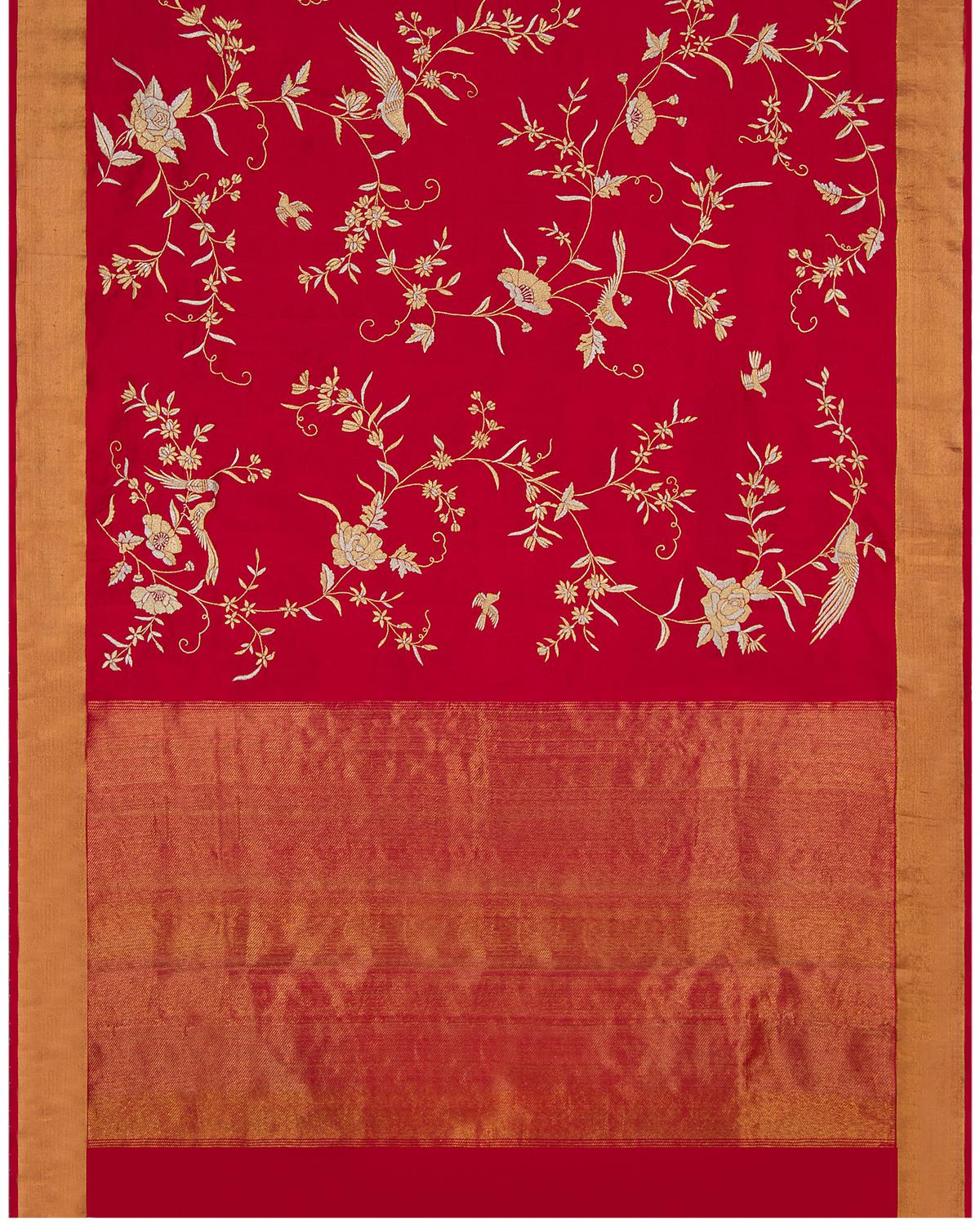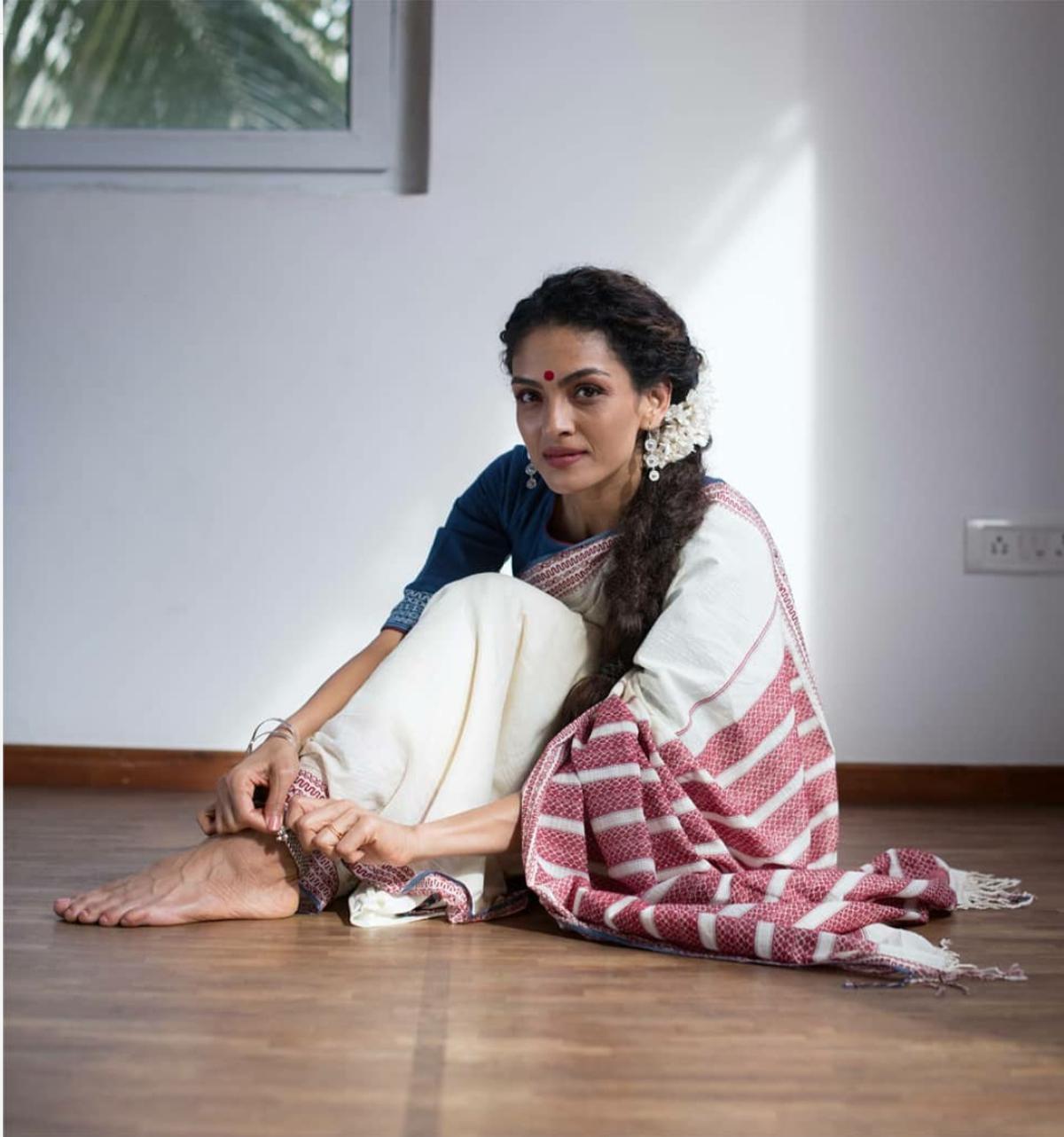Why a good collaboration is not merely the union of two crafts, but an expression of respect, generosity and creativity
Why a good collaboration is not merely the union of two crafts, but an expression of respect, generosity and creativity
Ashdeen Lilaowala understands collaborations in a way few of his peers do. Over the years, he has consistently worked with a diverse range of brands such as Ekaya (in 2016, the Banarasi silks were woven with Parsi gara motifs like birds of paradise, chrysanthemums and peonies) and, most recently, Chennai’s Kanakavalli, the kanjeevaram brand founded by Ahalya S.
The Delhi-based designer, who roots the 200-year-old needlepoint technique (which originated in China and was popularised by the Parsis in India) in a contemporary vocabulary, maintains that with each partnership he takes “Parsi gara design and embroidery, and pushes it further because good collaborations are a marriage of equals”.
An embroiderer at work on an Ashdeen x Kanakavalli sari
With the Ashdeen x Kanakavalli collab, he and Ahalya deliberated over a year, with a lot of thought and experimentation going into each choice of colour, thread and pattern, to arrive at a language for the 40-piece embroidered collection. When it released earlier this month, it was received with harsh criticism from ‘purists’ and lavish praise from ‘modernists’. Yet this collection is distinct from anything else seen before as a rendition of a kanjeevaram sari.
For years, popular wedding silk retailers like Pothys, RmKv and Saravana Stores have stocked embroidered kanjeevarams. I have struggled to articulate the aesthetic difference, beyond descriptions of material quality or the distended size of motifs. It was only when I saw the two versions (the collab and other embroidered kanjeevarams), meant for completely different markets, side by side did the sincerity of the language reveal itself. What works with Ashdeen x Kanakavalli is that they have explored the 12 pillars of a good collaboration: contrast, balance, emphasis, proportion, hierarchy, repetition, rhythm, pattern, white space, movement, variety, and unity.
Carrying forward the tradition
If there’s one thread that firmly places the gara x kanjeevaram collection within our sari vaults, it is this: in India, collaboration is a tradition .
At its core, it is the will of creative minds coming together to lift each other’s art or practice because they passionately believe they are effecting a change for the better — not just within their skill sets, but also for the gamut of people involved, from the artists and craftsperson to the consumer. Examine the precincts of your own favourite textile, food or even music, and you will find at least five scenarios of innovation in practices. All the result of good collaborations. Here are three of my all-time favourites:

Ashdeen x Kanakavalli
Ikat in the weave: In 2015, T.N. Venkatesh, the former managing director of Co-optex, took his weavers to visit, and learn from, several ikat weaving centres in Nalgonda and Puttapakka in Andhra Pradesh. An enterprising administrator, he also invited a few loyal sari patrons of the Tamil Nadu Handloom Weavers’ Cooperative Society (or Co-optex) to accompany the entourage. Today, just seven years later, the Chinnalapatti sari that was once recognised as the poor sister to Kanchipuram’s sari is distinguished by the incorporation of ikat in its design practice. In one fell swoop, the weavers learnt a new skill and the women ensured the market was incentivised to support them.
The colour of mudras: The Bharatanatyam recitals of danseuse Rukmini Vijayakumar (@dancerrukmini on Instagram) are marked by contemporary renditions of classical themes.

Rukmini Vijayakumar
One is mesmerised not only by her physical prowess, but also by how different facets of artistry (like ballet references) collaborate to lift the performance. Her saris are chosen with particular care to draw attention to her movements, the colour juxtapositions highlighting mudras. Her jewellery, especially a signature waistband, have become design elements. The artist danseuse interprets musical compositions (an AR Rahman song was a particular favourite last year) by deftly marrying her movements with the beats.
Painting with the loom
Between the 1960s and 1980s, the Weavers’ Service Centres (WSC) were issued an edict to create wedding saris that brought together the different skill sets of its various representative centres. Weavers, craftspeople and painters were sent to interact with their peers in the hope that “something new” would be created. In the single-room museum of the Kanchipuram Weavers’ Society today, you can still see kanjeevaram saris woven with baluchari motifs. In a similar extension of the practice, WSCs are home to textiles designed by painters like Prabhakar Barwe, Anand Mohan Naik, and Gopal Adivrekar, who practised textile design as an art before establishing themselves as independent artists.
A spiritual meeting: Then there is the mystical collaboration, where the enhancement of a skill set is pushed to the boundaries of near spirituality. Bharati Govindraj, the chairperson of the Karnataka Crafts Council, has an enviable collection of kanjeevarams embroidered with exquisite kantha by National Award-winner Mahua Sen Sarkar. The artist’s work mirrors her taste and love of textile and craft, quiet with richly-coloured embroideries of village scenes. It’s no easy task, with each collaboration being truly singular.
Ashdeen x Kanakavalli brings into focus the respect with which a good collaboration unfolds — the emphasis placed on picking nuances that enrich both practices without diminishing the other. Generosity is one of the key facets, as well as freedom of expression and artistic license. It is truly remarkable how weavers share their expertise with another cluster, without worrying about the result. How musicians and jewellers are delighted to learn that their work has reached a new audience through dancers. Or how a discerning patron and a risk-taking artisan can share an intimate confidence in the knowledge that a unique, co-created textile will bring joy.
Ally Matthan is a perfumer who studies community, identity and material science as a student of textiles with The Registry of Sarees.
























